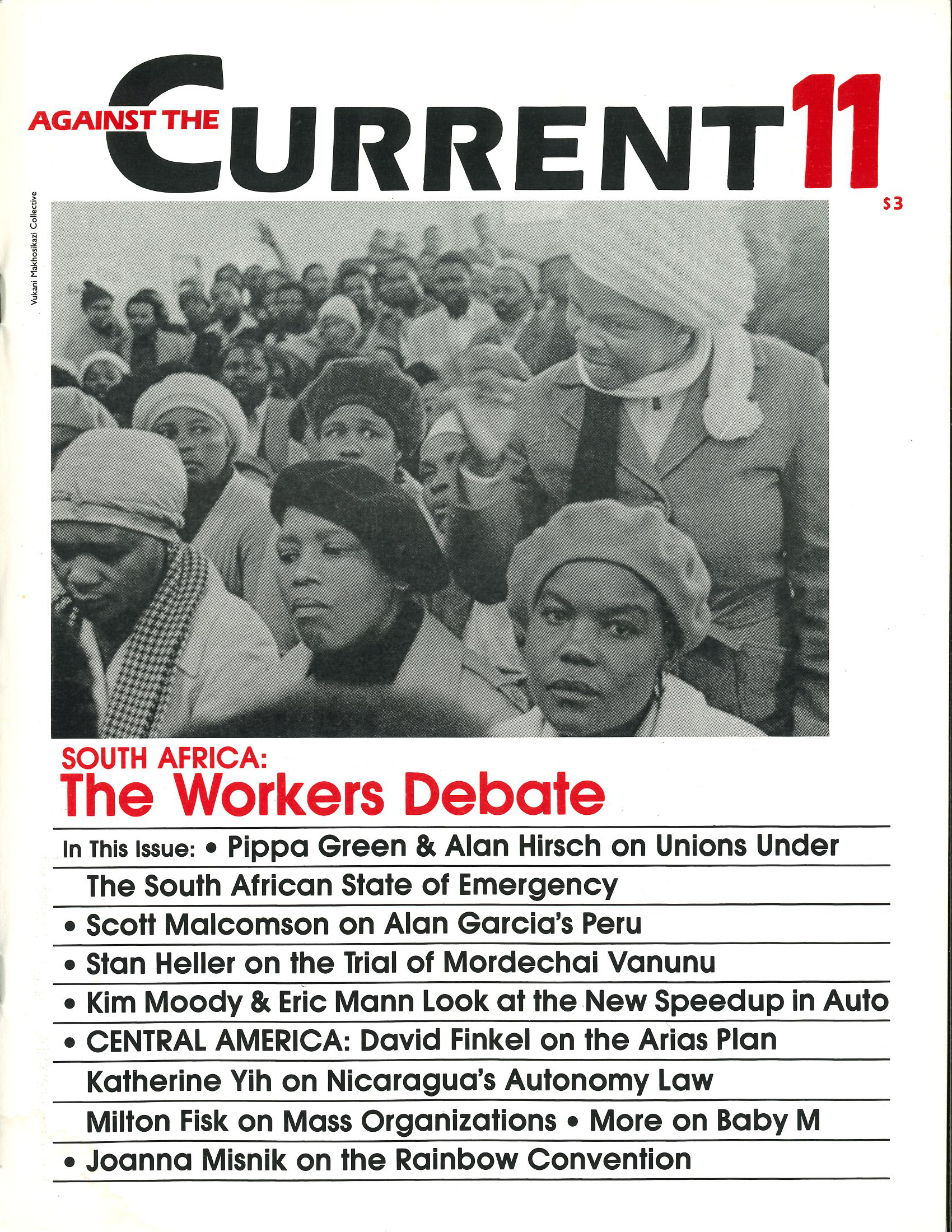Against the Current, No. 11, November-December 1987
-
The Crash of '87: Opening of a New Period?
— The Editors -
The Rainbow: Storm Clouds Ahead?
— Joanna Misnik -
Vanunu and the Israeli Bomb
— Stanley Heller -
Alan Garcia & the Crisis of Populist Rule in Peru
— Scott Malcomson -
On Sendero Luminoso -- Shining Path
— Scott Malcomson -
South Africa: The Black Unions & the State of Emergency
— Pippa Green & Alan Hirsch -
South African Unionists Back Divestment
— John Gomomo - Guidelines for Divestment
-
Of Scrooge, Bentham & Reagan
— Paul Siegel -
Random Shots: Pat Robertson's Miracle
— R.F. Kampfer - Auto Unionism in Crisis
-
It's Their Crisis -- But Our Jobs
— Robert Brenner interviews Eric Mann -
New Speedup in Auto
— Kim Moody - Central America
-
Central America's Peace Plan & the US. Solidarity Movement
— David Finkel -
CISPES: Challenge of Solidarity
— David Finkel -
Nicaragua's Atlantic Coast Dialogue: Autonomy & the Revolution
— Katherine Yih -
The FSLN, Mass Organizations & the Socialist Transition
— Milton Fisk - More Debate on Baby M
-
Debate on Baby M
— The Editors -
Protecting the Mother's Right Is Critical
— Nancy Holmstrom -
A Reply to Our Critics
— Johanna Brenner & Bill Resnick - In Memoriam
-
Harvey Goldberg: An Appreciation
— Patrick M. Quinn
John Gomomo
THE CONGRESS OF South African Trade Unions (COSATU) supports mandatory, comprehensive sanctions against the South African government as an important economic pressure. COSATU is, at the moment, discussing the effects of different kinds of sanctions internally.
The National Union of Metalworkers of South Africa (NUMSA), which represents 140,000 members, 22,000 of them autoworkers, and that was formed as a result of a merger of seven COSATU affiliates, wishes to condemn the attitude of General Motors (GM) towards South African workers.
The company, when it said it was withdrawing from South Africa, sold its holdings to the existing internal management. It has, however, maintained licensing and other links with the new South African company, Delta. Workers, who were anxious about their future in a town where unemployment reaches levels of forty percent, went on strike in October 1986, when GM announced its withdrawal. Among other things, they demanded severance pay and the liquidation of the pension fund and its payment to the workers.
Management reacted by taking the union to the Industrial Court on the grounds that the strike was “illegal,” and by firing 450 of the striking workers. There were also occasions when police were called onto the premises to evict workers who were sleeping in the factory. About 1,200 of the striking workers were taken back by the company after the strike, but the 450 workers were not reinstated. The new company hired workers to replace them. Since the takeover, it has refused to have any dealings with the union, which has represented workers there for the past decade.
Workers are not allowed to gather in small groups inside the factory, their time on the shop floor is strictly controlled. COSATU and other union newsletters are not allowed to be distributed to workers in the plant.
The union has reorganized at the factory and now has 900 members, but management still refuses to talk to the union. Although the new members constitute less than fifty percent of the plant, 450 of our members have not been reinstated. In addition, the company reneged on a previous agreement, not to sell to the military as soon as the internal management took over.
We believe that despite GM’s claim to have withdrawn, the economic links between GM and the new company do not weaken the apartheid system. But workers and their union have suffered under the new arrangement. The workers are demanding that the company negotiate with them in good faith and reinstate their dismissed colleagues.
We urge the U.S. community to support those workers that are the victims of GM’s management tactics and of the apartheid system. We are appealing to union and anti-apartheid groups in the U.S. to pressure GM, to use its influence with Delta so that the South African company will speak to the workers’ union.
–Statement from John Gomomo, Executive Committee Member, National Union of Metalworkers of South Africa; currently Shop Steward, Volkswagen; prepared for Michigan Coalition for Human Rights Conference on South Africa, Detroit, June 20, 1987.
November-December 1987, ATC 11

